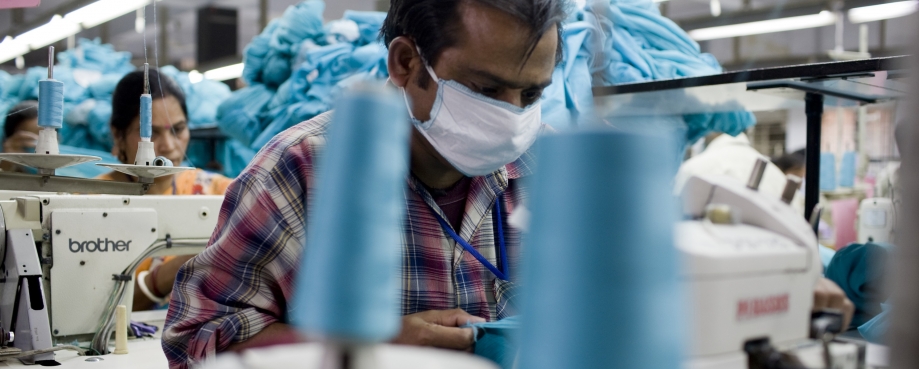
ETI attended the launch of the inaugural Corporate Human Rights Benchmark (CHRB) backed by investment firms and human rights organisations. It ranked 98 leading companies from the high-risk agricultural products, apparels and extractives sectors against their published human rights policies and performance. Our Head of Knowledge and Learning, Cindy Berman gives her views.
New advanced training course: Human rights due diligence
The Benchmark’s vision is to harness the competitive nature of markets to drive up companies’ human rights performance. It does this by ranking companies and making data freely available.
In this first round, ETI members assessed against the Benchmark were Gap, H&M, Inditex, Marks and Spencer, Next and Tesco. Marks and Spencer scored the highest.
Significantly, the CHRB is a collaborative effort involving leading investment firms and initiatives and human rights organisations.
Firms such as Aviva are keen to get investors thinking far more about the human rights impacts of their investments, and in rewarding companies that are more transparent about their policies and practices.They recognise that the success of investments are not to be judged on today’s market share index, but on the moral as well as commercial impacts of corporate operations in the long term.
To quote Aviva spokesperson Steve Waygood the Benchmark is about "enlightened self-interest" and about the "credibility, effectiveness and sustainability" of business.
It is ambitious and welcome. And it has the potential to be catalytic if it drives change through greater transparency. But it must get company buy-in, and needs to build on the collaboration it has established with key stakeholders.
However, in this first benchmarking exercise, very few companies have scores to be proud of!
Company scores
The Benchmark assessed firms on their policy commitments, embedding respect and human rights due diligence, remedies and grievance mechanisms, human rights practices, responsiveness to serious allegations and on transparency – and marked these out of a potential score of 100%.
Only six companies scored more than 50%.
But it's important to caution against drawing conclusions too quickly about who is "best in class". Being rewarded for what they publish does not necessarily equate to leadership on what companies do.
Some companies may not be as good at communicating ethical success. And at the end of the day, ETI cares more about what companies do than what they say they do. As important as transparency is, it doesn’t tell the whole story.
A long-term collaborative approach
Driving a race to the top is urgent but it also requires a long-term approach and collaboration.
There are multiple actors and factors that contribute to workers rights violations: inadequate legislation and regulation by governments; companies taking advantage of their power to exploit the most vulnerable workers; and preventing workers from their right to join a union and negotiating their own terms and conditions of work.
It was therefore really important that the ITUC was involved in the Benchmark, and that General Secretary, Sharan Burrow spoke at the launch.
Trades unions must remain engaged because workers voices must be at the heart of any response to tackle human rights abuses, even though, as Sharan Burrow pointed out, 94% of the world’s workforce is not directly employed by these large companies but lies hidden in the supply chain or the informal economy.
Civil society, investors, the public and governments must play their part in holding companies to account, whilst companies can do a lot more individually and collectively to drive change. It’s a shame, for example, that the Benchmark does not recognise companies’ involvement in collaborative initiatives such as the Bangladesh Accord.
Critical issues
Listening to the speakers at the launch, four issues struck me as critical and requiring far more attention:
- Governance: ensuring companies have the right systems to conduct due diligence, establish clear benchmarks and KPIs for change, and then ensuring that Boards and CEOs are holding their staff responsible for ensuring that changes are made and that progress is continuously tracked.
- Commercial and price pressures: unless companies are honest about the fact that they need to pay a fair price for the goods and services they buy, we will keep going around in circles. We know that suppliers are often accepting orders below prices that will enable them to pay decent wages and guarantee reasonable working hours in safe workplaces. All companies and consumers will need to recognise that workers cannot continue to bear the cost of these price squeezes.
- Impunity: Phil Bloomer of the Business and Human Rights Resource Centre pointed out that there is culture of impunity for most companies around their bad behaviour. Three-quarters of companies said nothing about remedy for workers whose rights have been violated, only one-third of companies reported on identifying risks, and only one-fifth got any score for acting on that risk. That’s unacceptable.
- Quality and credibility of information: there is little agreement between key stakeholders on what constitutes credible and verifiable information, and this is key when it comes to decision-making. We all have a long way to go, although ETI has done a fair amount of thinking about this in our Due Diligence Framework.
The Benchmark was developed by Aviva Investors, the Business and Human Rights Resource Centre (BHRCC), Calvert Investments, the Institute for Human Rights and Business (IHRB), VBDO and VigeoEiris.
The next report will be available in September 2018. We can expect to see it expanding to other sectors and it aims to rank the top 500 companies each year.
